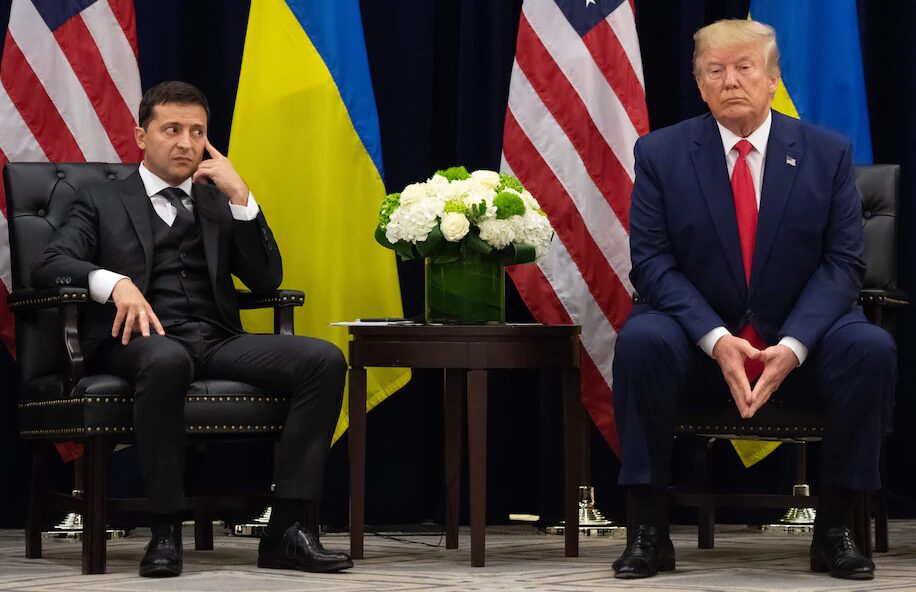3 mins read
Yes, Russia Helped Trump Win, But Not As You Might Think
In 2022, Biden pledged to defeat Russia. But today, Russia is winning the war. Americans love winners, and hate losers. Had Biden defeated Putin, he’d now be a national hero.
5 mins read

KYIV — Ukrainian officials’ congratulations of President-elect Donald Trump on Wednesday were fast and effusive — but did little to mask the fears and uncertainty that now hangs over Ukraine’s future.
Many Ukrainian lawmakers recognize that securing the American weapons needed in the war against Russia will require persuading Trump to back a fight that he appears to consider too expensive.
In an early tweet, Ukrainian President Volodymyr Zelensky called it an “impressive election victory.” He reminded Trump of the “great meeting” they had in September in the United States and talked about “ways to put an end to Russian aggression against Ukraine.”
In a subsequent phone call late on Wednesday, he said he congratulated Trump “on his historic landslide victory” and they agreed “to maintain close dialogue and advance our cooperation.”
Andriy Yermak, head the presidential office and Zelensky’s main adviser, echoed his boss’s congratulations, adding that it was “essential that Ukraine has bipartisan support in the U.S.”
“Russia and autocrats only understand the language of power,” Yermak wrote on Telegram. “Aggressors must be brought back within clear bounds of justice.”
But the extent to which Zelensky and Trump will find common ground — especially given their fraught history — remains to be seen, especially because Trump has expressed misgivings about continuing to support Ukraine’s war effort.
Zelensky insists that Ukraine must continue fighting and not make any territorial compromises. But the country is critically dependent on economic and military aid from the United States.
Trump on the other hand has promised to end the war in Ukraine as soon as possible. In his address Wednesday, he said: “I’m not going to start wars. I’m going to stop wars.”
Last month, Trump seemed to blame Zelensky for letting the conflict with Russia begin and called him “one of the greatest salesmen I’ve ever seen.” But Trump also said that this does not mean “I don’t want to help him, because I feel very badly” for Ukrainians.

Trump’s dealings with Zelensky and Ukraine at times has been complicated, dating back to 2019, when Trump cut off military aid to Ukraine. That’s also when he held a phone call with Zelensky, allegedly pressuring him to help in Trump’s reelection campaign, leading to his first impeachment.
In the run-up to Election Day, Zelensky also alienated Trump’s running mate, JD Vance, calling him “too radical” after he suggested that Ukraine should concede large parts of its territory to Russia and freeze current battle lines.
But some Ukrainian officials expressed hope that a change of power in Washington could work to Kyiv’s advantage. Although they have been vocally grateful for American support of Ukraine, they also have criticized the slow pace with which the Biden administration has released weapons and the restrictions placed on long-range strikes within Russian territory.
“Now that Trump has become president again, Ukraine becomes a matter of his success or failure. It’s now a personal matter,” said Oleksandr Merezhko, chairman of the Ukrainian parliament’s foreign affairs committee.
“He doesn’t want it to be said in the future that ‘on his watch,’ he lost Ukraine. This is now his personal story, and it will be one of the markers of whether he will be a successful president and go down in history or not,” Merezhko said.
Merezhko said that in general, Trump has been more supportive of Ukraine than President Barack Obama, who barred Kyiv from receiving lethal American weapons when he was in office.
Trump’s statements during the campaign “should not be taken seriously,” Merezhko said. “There’s a saying, ‘People lie most during elections and after hunting.’” Trump’s campaign rhetoric was “aimed at winning. … Only tomorrow will he start thinking,” Merezhko said.
But Ukrainian officials also acknowledge they must identify arguments to win Trump over and persuade him to back Ukraine. With his election, U.S. policy could become more transactional.
“The logic of geopolitics will look different,” Pavlo Klimkin, Ukraine’s former foreign minister, told Ukrainian NV radio, adding that “being a businessman, Trump views geopolitics as a ‘You give me this, I give you that’ exchange.”
Ukrainian opposition parliament deputy Oleksiy Honcharenko said the world is moving “from a rules-based international order to a deals-based international order, [and] under Donald Trump, the global order will be based not on rules but on agreements.”
What Ukraine would be able to offer Trump is an open question. And Russian President Vladimir Putin will also be making arguments and offering proposals.
Ukraine “must stop appealing to values and such and instead demonstrate what we have and why we are needed,” Honcharenko wrote on Telegram. “And we do have something: one of the world’s best armies, a key role in the global food market, technologies — primarily military — and resources,” he wrote.
Whatever the Ukrainians use as their sales pitch, the war in Ukraine has entered a new phase, some say.
“It’s the end of an era and the start of a new one,” said former Ukrainian foreign minister Dmytro Kuleba. “For Ukraine — and not only for us — this means nothing will be done quite the same as in the past 2½ years.”
But also, any promise Putin might make to Trump about bringing the war to an end might still be tough to realize.
“It would be a grave mistake to believe that Ukraine will rush to the negotiating table now,” he said.
David L. Stern has worked for news outlets in Russia, Eastern Europe, the Caucasus, the Middle East and Central Asia. He has lived in Ukraine since 2009, covering the 2014 Maidan revolution, war in the country’s east and now Russia’s 2022 invasion.